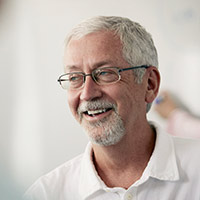
Timothy J. Ley, MD, a leukemia researcher and hematologist at Washington University School of Medicine in St. Louis, has received a seven-year, $6.4 million Outstanding Investigator Award from the National Cancer Institute (NCI) of the National Institutes of Health (NIH).
The funding will allow him to continue research aimed at understanding the mutations that initiate acute myeloid leukemia (AML) and how they might be targeted with new approaches.
This is the first year the NCI has given Outstanding Investigator Awards, which go to scientists with “outstanding records of productivity” to pursue cancer research with unusual potential, according to the NCI.
“The NCI Outstanding Investigator Award addresses a problem that many cancer researchers experience: finding a balance between focusing on their science while ensuring that they will have funds to continue their research in the future,” said Dinah Singer, PhD, director of the NCI’s Division of Cancer Biology. “With seven years of uninterrupted funding, NCI is providing investigators the opportunity to fully develop exceptional and ambitious cancer research programs.”
AML is a cancer of blood-forming cells in the bone marrow. In 2014, about 19,000 new cases of AML were diagnosed in the United States, and 14,000 patients died from the disease. The AML program at Siteman Cancer Center at Barnes-Jewish Hospital and Washington University School of Medicine is internationally known and is a major referral center for stem cell transplantation and clinical trials involving these patients.
In 2008, Ley led the team at Washington University that sequenced the first cancer genome, from a woman with AML. Team members included: Richard Wilson, PhD, the Alan A. and Edith L. Wolff Distinguished Professor of Medicine; Elaine Mardis, PhD, the Robert E. and Louise F. Dunn Distinguished Professor of Medicine; and John DiPersio, MD, PhD, the Virginia E. and Sam J. Golman Professor of Medicine.
Since then, AML has been a major focus of the McDonnell Genome Institute, and hundreds of additional AML genomes have been sequenced with funds from an NCI Program Project Grant that Ley leads. These studies have identified nearly all of the recurrently mutated genes that are important for the development of this disease, and have revealed the major causes of clinical heterogeneity among patients.
But perhaps most importantly, these studies have revealed a set of specific mutations that are important for initiating AML; these mutations are found in all of the cells within the tumor, no matter how it evolves.
“These mutations are the ones that will be the most critical to understand and target, but we already know that developing new therapeutic approaches is going to be very difficult,” Ley said. “Obtaining this long-term funding from the NCI is a great boost to our program and should give us the time and resources that we need to solve this problem. It’s a great honor to have been selected.”
In June, President Barack Obama appointed Ley to the National Cancer Advisory Board, which advises the U.S. Secretary of Health and Human Services, the director of the National Cancer Institute, and the president on the nation’s cancer program, and reviews proposals awarded by the NCI. Ley also is an elected member of the National Academy of Medicine, and of the American Academy of Arts and Sciences.
Ley is the Lewis T. and Rosalind B. Apple Professor of Medicine and chief of the Section of Stem Cell Biology in the Division of Oncology, associate director for cancer genomics at the McDonnell Genome Institute, and a research member of the Siteman Cancer Center.
Washington University School of Medicine’s 2,100 employed and volunteer faculty physicians also are the medical staff of Barnes-Jewish and St. Louis Children’s hospitals. The School of Medicine is one of the leading medical research, teaching and patient-care institutions in the nation, currently ranked sixth in the nation by U.S. News & World Report. Through its affiliations with Barnes-Jewish and St. Louis Children’s hospitals, the School of Medicine is linked to BJC HealthCare.
Siteman Cancer Center, ranked among the top cancer treatment centers by U.S. News & World Report, also is one of only a few cancer centers in the U.S. to receive the highest rating of the National Cancer Institute (NCI). Comprising the cancer research, prevention and treatment programs of Barnes-Jewish Hospital and Washington University School of Medicine in St. Louis, Siteman is Missouri’s only NCI-designated Comprehensive Cancer Center and the state’s only member of the National Comprehensive Cancer Network.